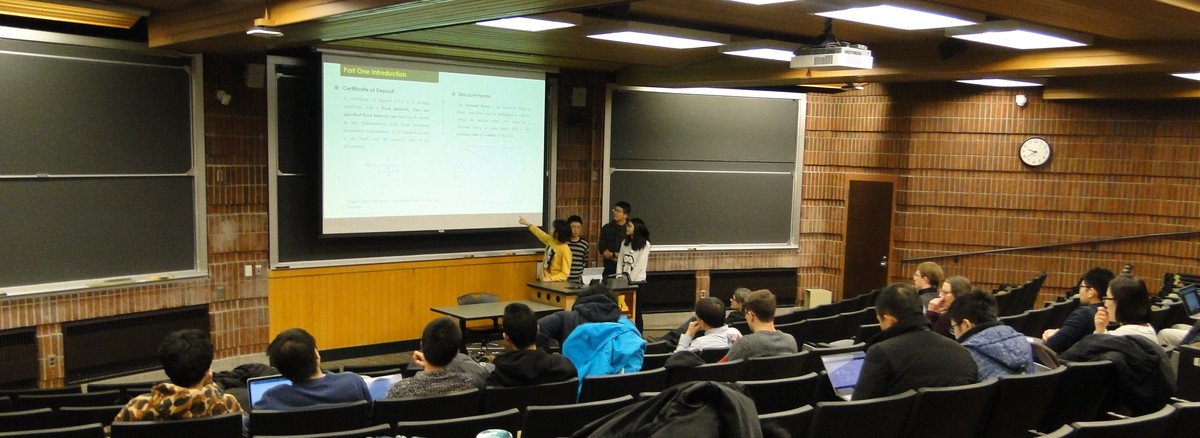2021 Financial Mathematics Winter Modeling Workshop
Description: The Master of Financial Mathematics (MFM) and Fundamentals of Quantitative Finance (FQF) programs at the University of Minnesota's School of Mathematics host a 10-day workshop for MFM, FQF and PhD students every winter between fall and spring semesters
Format: Students will work in teams of up to 5 students under the guidance of a mentor from the field of quantitative finance. The mentor will help guide the students in the modeling process, analysis and computational work associated with a real-world quantitative finance modeling problem. A progress report from each team will be scheduled during the period. In addition, each team will be expected to make a final oral presentation and submit a written report at the end of the 10-day period.
Projects and Industry Mentors
Team 1 - Industry Mentor - Hartmut Durchschlag: Hartmut Durchschlag is a Quantitative Researcher at Cargill. He is currently doing market microstructure research and strategies for algorithmic trading/execution. Prior to his current role he worked for three years as a Principal Data Scientist in Cargill’s Data Science Group. He led the systematic trading efforts within Cargill and worked on various commodity trading strategies. In collaboration with the University of Minnesota’s Institute for Mathematics and its Applications (IMA), where Cargill is a Participating Organization, Hartmut oversees 5 IMA Postdocs with whom he solves challenging and complex agricultural trading problems. Prior to taking on a data science role at Cargill Hartmut spent three years as Commodity Quantitative Analyst/Trader in Cargill’s former power trading division. There he built a systematic trading platform and traded FTRs. Before joining Cargill Hartmut spent 13 years at Allianz Investment Management (AIM) in various quantitative analysis roles. He built his expertise in option pricing, stochastic volatility models and machine learning in finance during his tenure at AIM.
Throughout Hartmut’s career, his body of work has revolved around solving complex problems, identifying alpha and managing stakeholders’ expectations. Hartmut earned an MBA from the University of Regensburg in Southeastern Germany and a Master of Financial Mathematics from the University of Minnesota. He is currently a PhD candidate in Study Control Science and Dynamical Systems at the University of Minnesota.
Project- Market Microstructure: In this module we will have a firsthand look at some stylized facts of market microstructure. Especially we will clean, transform and merge tick data, so that we can estimate the market impact of market orders. We will also learn about various limit order book changes (e.g., market orders, limit orders, cancelations) that impact price dynamics. We will uncover these dependencies via point processes.
Team 2 - Industry Mentor - Keenan Gao: Keenan Gao works as a quantitative model validation analyst for the Federal Reserve’s CCAR/DFAST supervisory stress testing program, focusing on market risk and counterparty credit risk. Prior to the Fed, she worked at U.S. Bank developing credit risk models for residential mortgage portfolios. She earned a master’s degree in financial mathematics from University of Minnesota, and a B.S. in mathematical sciences from Carnegie Mellon University.
Project - Visualizing the Impact of a Pandemic: How does the 2020 COVID-19 pandemic differ from the 2007-08 financial crisis? Using a variety of macroeconomic and financial market indicators, participants will produce data visualizations of how both crises unfolded in real-time using animated graphs and geospatial maps in R. The goal of this project is to teach participants how to use compelling data visualizations to demonstrate ideas, analysis, and findings and communicate them to a broader audience. Prior experience with data visualization and R is not required.
Team 3 - Industry Mentor - He Lu: Mr. Lu has a strong background in quantitative analysis and risk management. He is a co-founder of Bluewater Financial Technologies and currently serves as CTO, He’s responsibilities include IT architecture, research, and product development. He’s background in financial product development, MSR modeling, risk management, and derivatives trading provides He with a unique perspective to inform the “Tech” side of Blue Water. Prior to joining Blue Water, He Lu worked as a portfolio manager at Incenter, responsible for MSR modeling, risk analysis, and MSR hedging. Earlier in his career, He served as an MSR modeler and risk manager at U.S. Bank, responsible for their OAS valuation framework development and risk management. He earned a Master Degree in Financial Mathematics from the University of Minnesota in 2014.
Project - Data Science in Mortgage Prepayment and Delinquency Rates: Prepayment and delinquency rate modeling are critical in pricing mortgage-related financial products like whole loans, mortgage-backed securities, mortgage servicing rights, etc. Those assets are major elements of the U.S fixed income market. Working with a large loan-level dataset, participants will gain hands-on experiences ranging from building a data pipeline and database, conducting data analysis and visualization, to exploring and applying various statistical and machine learning modeling techniques. All exercises will be completed using Python.
Team 4 - Industry Mentor - Jing Wang: Dr. Wang is currently a senior portfolio manager at Thrivent managing active quantitative equity portfolios and passive index funds. Prior to joining Thrivent, Dr Wang was a managing director at Pine River Capital Management, where his responsibility included quantitative modeling development, strategy research and risk management covering a variety of asset classes, including equity, equity derivatives, credit, and fixed income etc. Dr. Wang earned his PhD in applied mathematics from the University of Minnesota.
Project - Quant Equity Strategy using QuantConnect: In this module, we will be using the Quant Connect platform to build and analyze quant equity portfolios. We will start with constructing single factor equity portfolios and then explore using machine algorithms to construct/analyze dynamic factor portfolios. The Quant Connect platform uses Python for back-testing strategies, the participants are expected to have some programing
